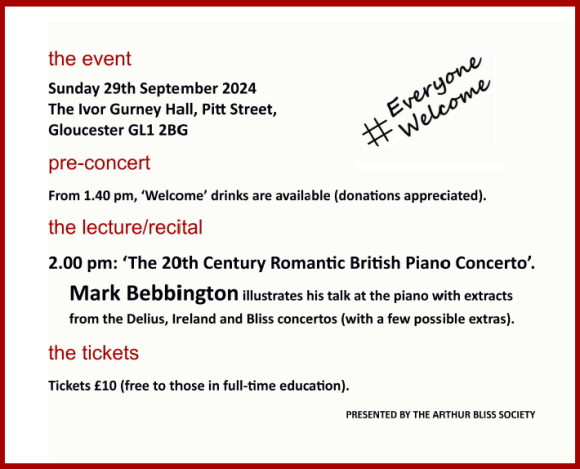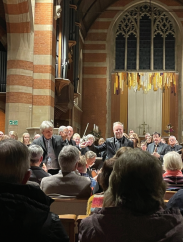Events

The lecture/recital is open to all, and (for ABS members) the AGM will follow.
/
 2024 got off to a tremendous start in February with Mark Bebbington’s wonderful performance of the Piano Concerto in Worcester, with the excellent Worcestershire Symphony Orchestra conducted by Keith Slade. It was the first time that Mark had performed the work in public and what a splendid performance he gave of this virtuoso work. There will be further opportunities to hear him perform the concerto later this year and indeed next.
2024 got off to a tremendous start in February with Mark Bebbington’s wonderful performance of the Piano Concerto in Worcester, with the excellent Worcestershire Symphony Orchestra conducted by Keith Slade. It was the first time that Mark had performed the work in public and what a splendid performance he gave of this virtuoso work. There will be further opportunities to hear him perform the concerto later this year and indeed next.
Here are some of David Salter’s observations after the event: ‘Mark Bebbington ably expressed the work’s heroic qualities in the first movement, the poetry in the quieter intimate music of the outer sections of the slow movement, and also its jazziness, lyricism and the edginess lurking beneath the surface. The excellent orchestral playing was fresh and exuberant throughout, with Mark demonstrating total mastery of the demanding score. Significantly, the orchestra members and conductor Keith Slade (pictured here with Mark Bebbington acknowledging the applause) are anxious to perform more Bliss works.’
In March, Philip Wilby, Andrew Burn and David Salter were privileged to be able to attend the Chandos recording of the Bliss works for brass (including arrangements of Checkmate and Adam Zero) by the Black Dyke Band conducted by their President, John Wilson. What total professionalism these amateur musicians – some as young as 19 – demonstrate. Ventures such as this introduce the music of Bliss to completely new audiences.
 In the ABS Journal, Andrew Burn (representing the Bliss Trust) wrote eloquently of his experiences at the recording sessions, extracts from which are quoted here: ‘I was fascinated by the difference in approach to music making compared to professional orchestras – the layout of the band [which was more open for the Chandos recording session than the Black Dyke’s customary horseshoe shape (from John O’Brien, Cornettist in the Black Dyke Band)], the technical prowess and musicianship of the players which are second to none. There was no sense of the recording schedule being rigid – ten minutes before one session was due to start the band was already playing. Towards the end of another when the conductor John Wilson suggested that he’d start the next one by finishing the piece they were working on, the players wanted to continue until the recording was completed so that they’d start afresh with a new piece at the beginning of the next session. I asked Philip Wilby why the band didn’t tune in the way an orchestra would before the sessions. He replied “As for tuning… they did a little, but we usually tune in October (as they say!). Bands often play a hymn tune to get the pitch before every rehearsal. Very strange habits!”‘ Conductor John Wilson was meticulous in what he wanted, [sometimes demanding that the same section be played multiple times, each time with different nuances, so that he would have a number of options from which to choose during the editing process (John O’Brien again)], and this was achieved by ‘coaxing the musicians to give of their very best with smiles, praise, good humour and anecdotes. The last ten minutes of the evening session on Saturday was simply extraordinary as the ending of Checkmate got louder and more intense as John asked for one more “take”. One felt it could blow the roof off Dewsbury Town Hall. Only one word describes it for me, which is Elgar’s deliberate mis-spelling: “golorious”‘.
In the ABS Journal, Andrew Burn (representing the Bliss Trust) wrote eloquently of his experiences at the recording sessions, extracts from which are quoted here: ‘I was fascinated by the difference in approach to music making compared to professional orchestras – the layout of the band [which was more open for the Chandos recording session than the Black Dyke’s customary horseshoe shape (from John O’Brien, Cornettist in the Black Dyke Band)], the technical prowess and musicianship of the players which are second to none. There was no sense of the recording schedule being rigid – ten minutes before one session was due to start the band was already playing. Towards the end of another when the conductor John Wilson suggested that he’d start the next one by finishing the piece they were working on, the players wanted to continue until the recording was completed so that they’d start afresh with a new piece at the beginning of the next session. I asked Philip Wilby why the band didn’t tune in the way an orchestra would before the sessions. He replied “As for tuning… they did a little, but we usually tune in October (as they say!). Bands often play a hymn tune to get the pitch before every rehearsal. Very strange habits!”‘ Conductor John Wilson was meticulous in what he wanted, [sometimes demanding that the same section be played multiple times, each time with different nuances, so that he would have a number of options from which to choose during the editing process (John O’Brien again)], and this was achieved by ‘coaxing the musicians to give of their very best with smiles, praise, good humour and anecdotes. The last ten minutes of the evening session on Saturday was simply extraordinary as the ending of Checkmate got louder and more intense as John asked for one more “take”. One felt it could blow the roof off Dewsbury Town Hall. Only one word describes it for me, which is Elgar’s deliberate mis-spelling: “golorious”‘.
The disc ‘Bliss Works for Brass Band’ was released in August, featuring Kenilworth, The Belmont Variations, Four Dances from Checkmate, Suite from Things to Come, Suite from Adam Zero, arrangements of Welcome the Queen and The Royal Palaces and more.
/
The Society arranges occasional gatherings of members and friends for informal pub/restaurant lunches or pre-concert suppers whenever Committee members are able to attend concerts where Bliss works are being played. We have enjoyed meeting members and friends in London, Luton, Harrogate, Worcester, Hereford, Shrewsbury and elsewhere.
Other highlights were in May 2011, when Rupert Luck and Matthew Rickard performed the restored Violin Sonata at an event jointly sponsored by the Arthur Bliss Society and the Ivor Gurney Society and in March 2015, when the Society arranged to have a Bliss work included in one of the regular Lunchtime Recitals at Cheltenham Town Hall at which Rebeca Omordia played the Piano Suite. At the Three Choirs Festivals in 2006 and 2015 (both in Hereford) we arranged highly enjoyable social events, each of them taking place before a concert featuring Bliss work – a lunch out in the country setting of Wyastone in 2006 and the Tea and Talk at The Left Bank complex, beautifully situated by the river Wye, in July 2015.
More details of these and other ABS events can be found in the sub items listed under Events on the main menu.
